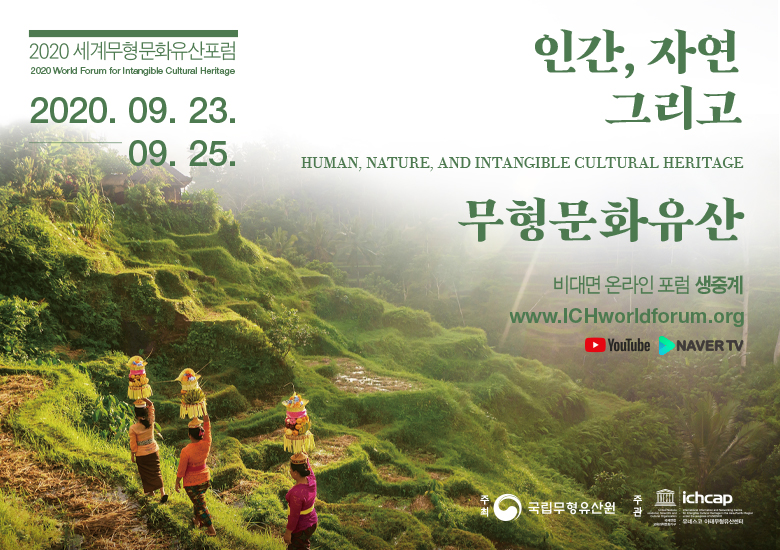Project Description
2020 World Forum for Intangible Cultural Heritage
Human, Nature, and Intangible Cultural Heritage
2020 World Forum for Intangible Cultural Heritage, Online Forum due to the COVID-19 Pandemic
2020. 09. 23 (Wed) ~ 25 (Fri).

Invitation
Human, Nature, and Intangible Cultural Heritage
2020 World Forum for Intangible Cultural Heritage, Online Forum due to the COVID-19 Pandemic
2020. 09. 23 (Wed) ~ 25 (Fri).
Will our next generation thoroughly enjoy the clean water and fresh air, and abundance of nature that we all enjoy now?
Environmental sustainability is the most fundamental and urgent issue for humankind. Nonetheless, humanity has brought about climate change and the destruction of the natural environment in a relatively short time. This year, the pandemic of COVID-19 has caused tremendous causalities and brought significant changes around the world. Many experts attribute frequent emergence, and climate change influences the new viruses’ rapid spread in recent decades. The Republic of Korea is also experiencing more and more side effects of extreme weather every year, such as extreme heat and cold waves, unprecedented floods, and severe droughts.
There has never been a single living species in Earth’s history that has damaged our planet as much as humankind has had done. How can we prepare and maintain both environmental and ecological sustainability in the face of natural calamities?
Intangible cultural heritage is the knowledge and practice of nature and the universe that individuals and communities worldwide have accumulated through interaction with nature. Specifically, it refers to knowledge about traditional ecology, knowledge about local animals, plants and environment, indigenous and native knowledge, traditional treatment systems, cosmology, etc. Such knowledge and practice can significantly influence and change our values and beliefs towards nature. For example, Switzerland and Austria’s avalanche risk management, which was registered on UNESCO’s Intangible Cultural Heritage List in 2018, is an excellent example of responding to a natural crisis while strengthening its identity and sense of camaraderie. Nevertheless, such intangible cultural heritage has been much threatened by climate change, a series of deforestation, and desertification due to humankind’s destruction. Therefore, in the 2020 World Intangible Cultural Heritage Forum, we would like to discuss the meaning and role of the intangible cultural heritage and how it can contribute to environmental sustainability.
We hope this forum will serve as a meaningful opportunity to rediscover the value of intangible cultural heritage and discuss and find new ways to protect humankind from the ecological crisis. Thank you.
